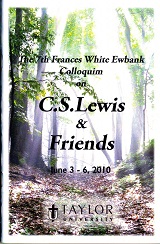Event Title
Academic Paper Session II-A
Location
Rupp 203
Start Date
4-6-2010 10:30 AM
Description
God Is Impartial: Frankenstein and George MacDonald" - Miho Yamaguchi
In George MacDonald’s David Elginbrod, a criminal named Funkelstein exercises his influence on a young woman and makes her an accessory to his crime. I thought that the name sounded somewhat similar to “Frankenstein” so I examined Mary Shelley’s Frankenstein to see if there was any connection. Consequently, I discovered that some episodes and arguments in the story were taken up by MacDonald and reflected in David Elginbrod and also in his Wingfold trilogy. It appears that MacDonald, having read Frankenstein, tried to answer the cries of despair uttered by Frankenstein’s monster – the cries that seem to be shared by many people. Among quite a few connections that I find between Frankenstein and MacDonald’s stories, this essay will focus on the issues concerning the Creator’s impartiality. In the arguments, I will also refer to an anecdote about John Wesley.
"Devils in My Heart: Chesterton's View of Human Nature through Father Brown" - Mark Eckel
“I had murdered them all myself.” Father Brown perhaps comes closest to true, biblical mystery. While a crime may have been solved, the good padre still wondered after the human penchant toward sin. Sherlock Holmes fans are used to deductive reasoning; a scientific analysis, assessing problems from the outside, in. Father Brown became the murderer because he was a murderer. Chesterton’s sleuth, a Catholic priest, saw people as they were, from the inside out. The mystery of our own nature continues: “The heart is hopelessly dark and deceitful, a puzzle that no one can figure out.”
In this paper I will seek to weave Chesterton’s views of inherent human corruption with his thinking, principally through Father Brown. Dorothy Sayers’ introduction to The Omnibus of Crime wonders aloud about human desire for tales of horror: “What a piece of work is man that he should enjoy this kind of thing! A very off piece of work – indeed, a mystery.”
"C.S. Lewis, Platonism, and Aslan's Country: Symbols of Heaven in The Chronicles of Narnia" - H. Dennis Fisher
C.S. Lewis held the conviction that all humans have meaningful images embedded in their minds that are often expressed in myths and legends. The richness of the Narnia Chronicles is often traceable to mythic patterns and philosophic thought employed by Lewis.
In The Chronicles of Narnia, C.S. Lewis envisions heaven through the symbolic presentation of “Aslan’s Country.” Every other world is linked to it as a peninsula is connected to a mighty continent. It can be reached only through magic or more often “the door of noble death.” Its boundaries expand according to the exploration quests of its inhabitants. Hence, Aslan’s admonition to come “further up and further in!”
Event Type
Paper
Academic Paper Session II-A
Rupp 203
God Is Impartial: Frankenstein and George MacDonald" - Miho Yamaguchi
In George MacDonald’s David Elginbrod, a criminal named Funkelstein exercises his influence on a young woman and makes her an accessory to his crime. I thought that the name sounded somewhat similar to “Frankenstein” so I examined Mary Shelley’s Frankenstein to see if there was any connection. Consequently, I discovered that some episodes and arguments in the story were taken up by MacDonald and reflected in David Elginbrod and also in his Wingfold trilogy. It appears that MacDonald, having read Frankenstein, tried to answer the cries of despair uttered by Frankenstein’s monster – the cries that seem to be shared by many people. Among quite a few connections that I find between Frankenstein and MacDonald’s stories, this essay will focus on the issues concerning the Creator’s impartiality. In the arguments, I will also refer to an anecdote about John Wesley.
"Devils in My Heart: Chesterton's View of Human Nature through Father Brown" - Mark Eckel
“I had murdered them all myself.” Father Brown perhaps comes closest to true, biblical mystery. While a crime may have been solved, the good padre still wondered after the human penchant toward sin. Sherlock Holmes fans are used to deductive reasoning; a scientific analysis, assessing problems from the outside, in. Father Brown became the murderer because he was a murderer. Chesterton’s sleuth, a Catholic priest, saw people as they were, from the inside out. The mystery of our own nature continues: “The heart is hopelessly dark and deceitful, a puzzle that no one can figure out.”
In this paper I will seek to weave Chesterton’s views of inherent human corruption with his thinking, principally through Father Brown. Dorothy Sayers’ introduction to The Omnibus of Crime wonders aloud about human desire for tales of horror: “What a piece of work is man that he should enjoy this kind of thing! A very off piece of work – indeed, a mystery.”
"C.S. Lewis, Platonism, and Aslan's Country: Symbols of Heaven in The Chronicles of Narnia" - H. Dennis Fisher
C.S. Lewis held the conviction that all humans have meaningful images embedded in their minds that are often expressed in myths and legends. The richness of the Narnia Chronicles is often traceable to mythic patterns and philosophic thought employed by Lewis.
In The Chronicles of Narnia, C.S. Lewis envisions heaven through the symbolic presentation of “Aslan’s Country.” Every other world is linked to it as a peninsula is connected to a mighty continent. It can be reached only through magic or more often “the door of noble death.” Its boundaries expand according to the exploration quests of its inhabitants. Hence, Aslan’s admonition to come “further up and further in!”


